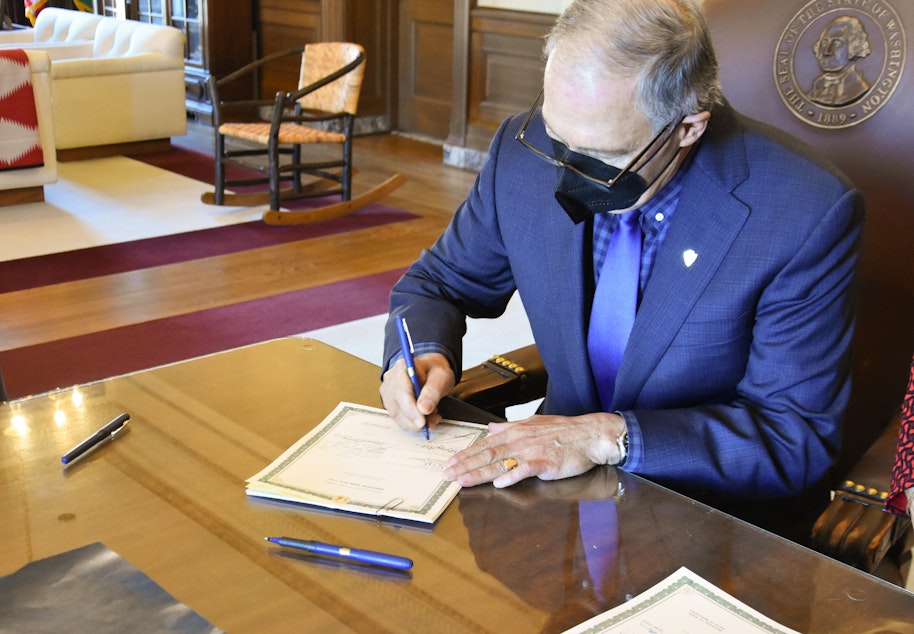Inslee has entered the 2022 session: WA Cares delay is the first bill signed into law

Washington Governor Jay Inslee has entered the chat — also known as the Senate State Government and Elections Committee.
Inslee testified before the committee Friday on behalf of his own proposal to criminalize some election-related disinformation.
That brings the proposal one step closer to Inslee's desk.
But a bill officially pausing the state's long-term care insurance program got there first.
Now the program known as WA Cares will not go into effect until July 2023, giving lawmakers time to make changes and address a wide range of concerns that made Democrats think twice about their own groundbreaking idea. WA Cares would be the first program of its kind in the country.
That means Washington state lawmakers have knocked out one of the biggest issues of the 2022 session just three weeks in.
Now what?
WA WILL STILL CARE IN 2023
The delay on WA Cares goes into effect immediately with Inslee's signature Thursday.
That means any employees who saw deductions from their paycheck to pay for the program will get refunds. Some, but not all, employers in Washington opted to start collecting the payroll tax as planned on January 1.
The law also made changes to eligibility that could be key to getting the program off the ground the second time around.
People born before January 1, 1968 will now qualify for partial benefits. Previously, someone nearing retirement age wouldn’t have enough working years left to become vested in the program.
Inslee also signed a second measure to allow some people to opt out. Among them: individuals who already have long-term care coverage, disabled veterans, military spouses and non-immigrant temporary workers.
People who likely wouldn't benefit from WA Cares because of its geographic limitations — as written, the benefits cannot be used outside of Washington — would also have the opportunity to opt out; for example, people who work in Washington but live elsewhere, like Oregon.
Sponsored
That law takes effect in 90 days.
So, this matter may be settled for the 2022 session.
Don't count on this being the last word, though.
KUOW Olympia Correspondent Austin Jenkins says it's still likely to see changes during the 2023 session, months before Inslee and his fellow Democrats try to launch it again.
LIES, DAMNED LIES AND 'THE BIG LIE'
Inslee wants state lawmakers to pass a bill that would criminalize lying about election results.
The legislation would make it a misdemeanor for elected officials or political candidates to "knowingly" or "maliciously" lie about an election if the lies then lead to violence.
Inslee testified in favor of the bill Friday during a legislative hearing, specifically responding to criticism that the proposal was contrary to the First Amendment.
"We don't have to choose between protecting democracy and protecting free speech," he said. "There cannot be free speech without democracy itself, so this bill protects both."
Inslee so far hasn't been able to alleviate those concerns, though.
Sponsored
Several constituents opposed to the bill testified against it — some claiming it's Inslee and Democrats who are threatening democracy, citing the "big lie" that the 2020 presidential election was stolen as evidence. That claim is false.
Still, legal experts could not say with any certainty whether the legislation would survive a challenge in court.
Catherine Ross is a constitutional law professor from George Washington University Law School and helped craft the bill.
She told lawmakers the legislation was carefully written so as not to violate constitutional rights, but that hasn't been put to the test.
"There is no way to know what will happen when this is challenged in court, assuming it's challenged in court, because this bills treads a lot of fresh territory," she said. "But... I think it has a real shot at surviving."
Sponsored
First, it'll have to survive the legislative process.
THE WAR ON CATALYTIC CONVERTER THEFT
Another proposal may have an easier time finding allies — at least among those who have fallen victim to catalytic converter thieves.
As of May 2021, catalytic converter theft was up more than 3,800% in Seattle and King County; 24 such thefts were reported in the Seattle area in 2019 compared to about 950 thefts in 2020.
Prime targets include the Toyota Prius and Honda Element.
The jump in thefts was stunning on its own. But the brazenness of the thieves and why they became such a draw made them a headache for car owners, law enforcement and even mechanics, whose shops have been targeted for customers' vehicles.
So, what can lawmakers do about it — short of personally guarding Washingtonians' cars?
The state House is considering a proposal to form a pilot program through the Washington State Patrol, using vehicle identification numbers to track stolen catalytic converters. That bill would also form a Catalytic Converter Task Force.
Another bill would require scrap metal businesses to keep records on transactions involving the precious metals in the devices. Those businesses would also be barred from any transaction involving a catalytic converter unless they're dealing with the owner of the vehicle it came from or a legitimate company.
In short, lawmakers seem keen to regulate thieves out of business.





